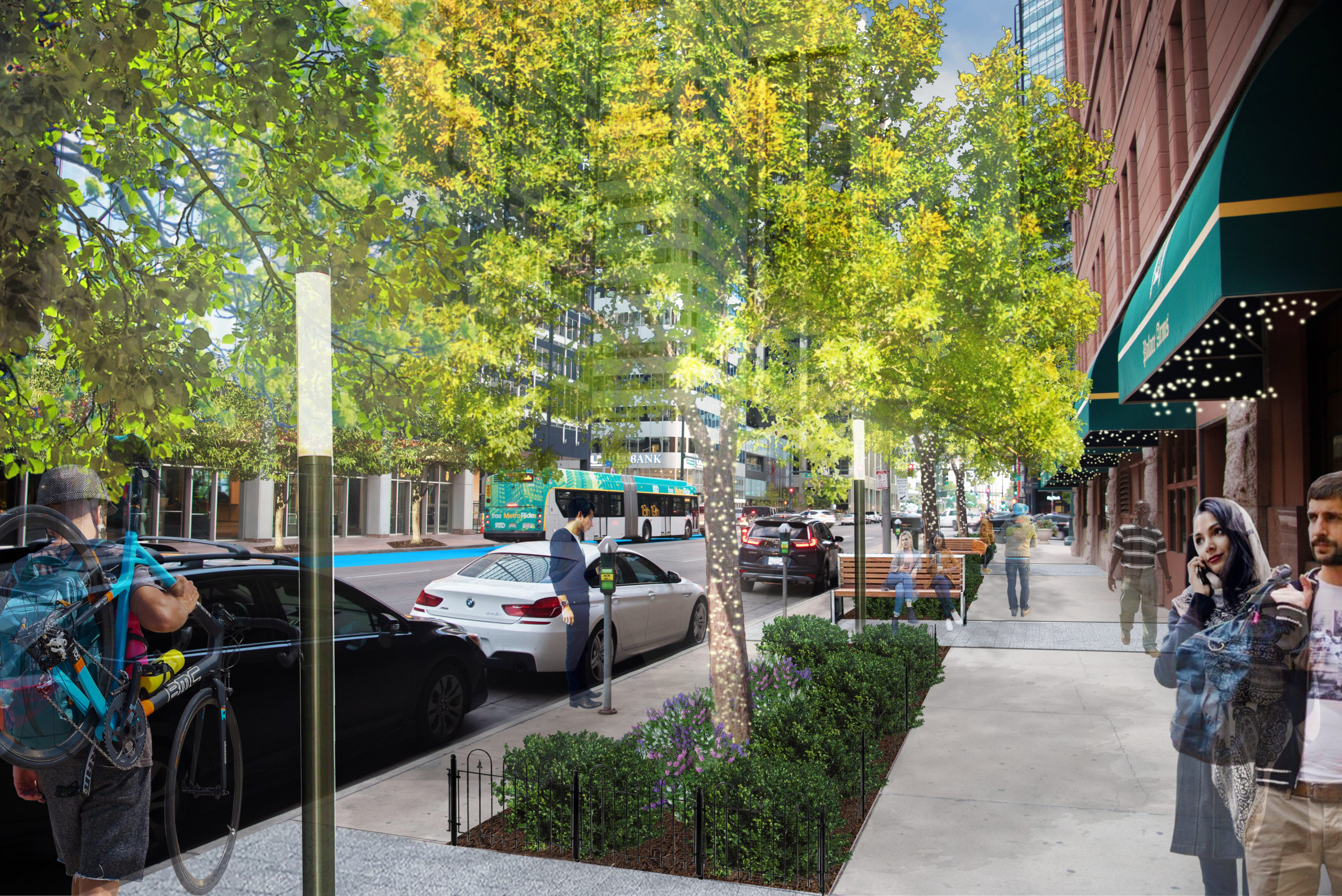By Chris Geddes, associate at Design Workshop.

With Earth Day upon us, Wednesday, April 22 – it’s a good time to share how the Downtown Denver Partnership (DDP), the City of Denver, and community leaders are working to be more sustainable and earth friendly. As landscape architects, Earth Day is every day in our field. We work tirelessly to make sure our designs are sustainable and resilient for today and the years ahead. I’m proud to support the DDP in an important program aimed at improving the quality of the Downtown Denver environment – the Urban Forest Initiative (UFI).
In 2018, the DDP and City collaborated to develop the Outdoor Downtown plan, a parks and public spaces action plan that identified key priorities for improving the outdoor environment in the center city. Led by Design Workshop, the plan identified the urban forest as one of the city’s greatest deficiencies and public support for the prioritization of its improvement was nearly universal. In fact, one of the plans top 10 priorities was tree-centric – to plant and maintain 1,000 new trees in downtown Denver.
Trees may seem like a simple solution to an environmental problem – and they are. However, the benefits of trees go far beyond the shade they provide on a hot summer day. Here are a few of their benefits from the DDP:
Trees are great for the environment – not only the “green” environment, but the environment that surrounds us. For instance:
- A 10% increase in urban tree canopy reduces ozone by 3-7%.
- Studies have shown that a mere 10% increase in tree canopy corresponds to a 12% decrease in crime.
Trees improve the bottom line. Trees are proven to have a positive impact on business earnings and property values.
- Businesses on treescaped streets show 12% higher income streams that those with a lack of tree canopy.
- Studies show that for every $1 invested in tree planting and maintenance, annual economic returns range from $1.37 to $5.82.
Trees are a benefit to our physical and emotional health. Trees are good for people. They bring shade, provide beauty, and promote activity (raise your hand if you’ve bagged leaves in October).
- Trees reduce the risk of heart disease, lung disease, and skin cancer.
- Office workers with a view of trees report significantly less stress and more job satisfaction.
Trees are critical to a resilient and comfortable climate. Trees mitigate pollutants, block winds, reduce glare, and protect us from the sun.
- One tree can absorb as much carbon in a year as a car produces while driving 26,000 miles.
- A mature tree canopy can reduce peak summer temperatures by 2-9 degrees F.
If trees are clearly the answer, why have we struggled to build a strong canopy in downtown Denver?
While the answer to this question may be wide-ranging, I propose that it comes down to three key factors: tree planting practices, human habit, and lack of stewardship. Historically, trees in Downtown Denver have been planted in 5’ x 5’ openings surrounded by pavement. Tree roots need room to spread in order to access air and water. When confined to such a small planting area, the growth potential is stunted. In downtown Denver, in fact, a typical tree only lives an average of 12 years and never reaches maturity. It’s difficult to grow a healthy and resilient canopy when trees do not have the infrastructure to survive.
Our human population is one of the greatest threats to our urban forest. Trees require care in order to thrive. In our bustling downtown core, however, we do not give them the respect they deserve. We plod over their roots, compacting the soil and removing access to air. We lock bikes to them, damaging their protective bark. We encourage our pets to do their business near them, introducing ammonia to the trunk and salt to the soil – both which either inhibit growth or accelerate damage.
Both planting practices and human habit are changeable, but they require one thing we haven’t done enough in Downtown Denver to date, and that is cultivate active stewardship of the urban canopy. We know how to grow trees in Denver – just look to our vast and beautiful park system – but we haven’t made it a priority to grow them the right way in our urban areas. We can change peoples’ habits, but to do so requires a commitment to educating the public on the importance of the tree canopy and their responsibility for it. If we put our voices, our actions, and our pocketbooks to use, we can affect change and create a thriving urban forest.
To show their commitment to improving the downtown tree canopy, the DDP in 2019 launched the UFI. The purpose of the initiative is to both plant new trees and to improve the growing conditions for existing trees downtown. The $5 million program is supported by both the public and private sectors, with one-third of the commitment coming from the City of Denver, another third from property owners, and the final amount from philanthropic donations. As part of the UFI, a grant program was also introduced in the summer of 2019 to offer financial assistance to property owners who want to invest in the urban forest. Now in its second round of funding, the grant program is contributing to 138 tree planting areas that will be improved or installed this year alone – a big step to achieving its ambitious goal of impacting 500 trees over 36 months.
How you can help?
While early interest in the UFI has been promising, the program needs sustained support from the Downtown community to achieve its goals. If you are a property owner Downtown, or if you know one – consider new tree planting or tree improvement projects and submit your application to the grant program. If you walk through downtown, stay out of tree planting areas
and walk your pets in our downtown parks. If you have the means, consider donating to the UFI and financially supporting the planting of new trees. And spread the word – both about the UFI and the benefits of trees in downtown Denver. Every voice matters.
For further information on the UFI, the grant program, and for ways to contribute, click here.
Chris Geddes, AICP, LEED® GA, CNU-A, is a planner and urban designer in Design Workshop’s Denver studio. He is driven by the desire to provide clients and community members a meaningful voice in the planning and design of public spaces. With over 20 years’ experience, he believes that it is the responsibility of designers to draw out the desires of those who use public space, illustrate those desires in ways that all can comprehend, and engage stakeholders in a way that builds trust. Chris works on projects of all scales, from community planning to the detailed design of public spaces, and is particularly fond of projects that tackle social and physical challenges.









